To ease allergy symptoms, you can brew herbal tea blends using ingredients like chamomile, ginger, and peppermint. Chamomile soothes inflammation, while ginger combats irritation. Peppermint helps clear airways and offers a revitalizing taste. Nettle leaf also acts as a natural antihistamine, making it a great addition to your blend. For a delicious mix, try combining chamomile and peppermint or nettle with ginger. Steep your chosen herbs for about 5 to 10 minutes to maximize their benefits. Exploring various combinations can help you find the perfect tea to relieve your symptoms effectively, and there's much more to discover about enhancing your relief!
Understanding Allergies
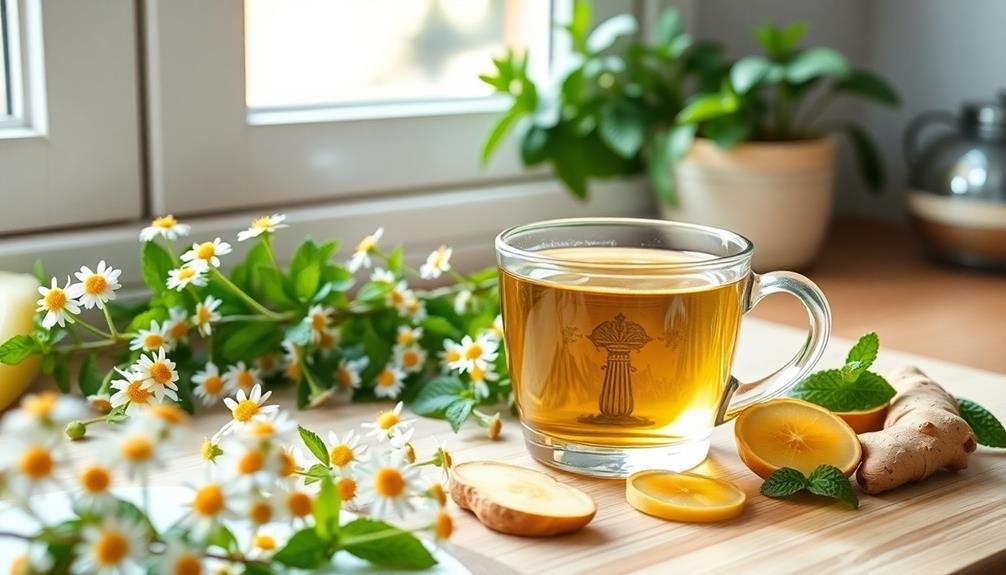
When it comes to understanding allergies, it's vital to recognize how your immune system reacts to certain substances. Allergies occur when your immune system mistakenly identifies a harmless substance, like pollen or dust mites, as a threat. In response, your body releases chemicals, including histamines, to fight off this perceived danger. This reaction leads to various allergy symptoms, such as sneezing, itching, and swelling.
You mightn't realize that allergens can vary widely. Common triggers include food, pet dander, mold, and environmental factors. Each person's immune response can differ, which is why some people suffer from allergies while others don't. If you're allergic to something, exposure can lead to uncomfortable reactions.
It's also important to note that allergies can develop at any age. You may have enjoyed certain foods or environments without issue for years, only to find yourself sneezing uncontrollably one day.
Understanding your specific triggers is vital for managing your symptoms effectively. Identifying and avoiding allergens can help reduce your body's unnecessary immune response and improve your quality of life.
Benefits of Herbal Tea
Herbal tea offers a soothing remedy for those grappling with allergy symptoms. When you sip on a warm cup, you're not just comforting your throat; you're also treating your body to a variety of health benefits. Herbal teas often contain antioxidants, which help combat oxidative stress and inflammation, making them a great addition to your wellness routine.
You'll find that many herbal blends can aid in digestion and boost your immune system, too. This can be incredibly helpful during allergy seasons when your body is working overtime to fend off irritants.
Furthermore, the calming properties of certain herbs can alleviate stress, which might otherwise exacerbate your allergy symptoms.
Another advantage of herbal tea is its versatility. You can easily customize your blend to suit your taste preferences and specific needs. Whether you enjoy chamomile's gentle sweetness or the spicy kick of ginger, there's an herbal tea for everyone.
Plus, the ritual of brewing and enjoying a warm cup can provide a moment of mindfulness in your day, helping you feel more centered. So, grab your favorite blend, and let the benefits of herbal tea support you during allergy season!
Key Ingredients for Relief
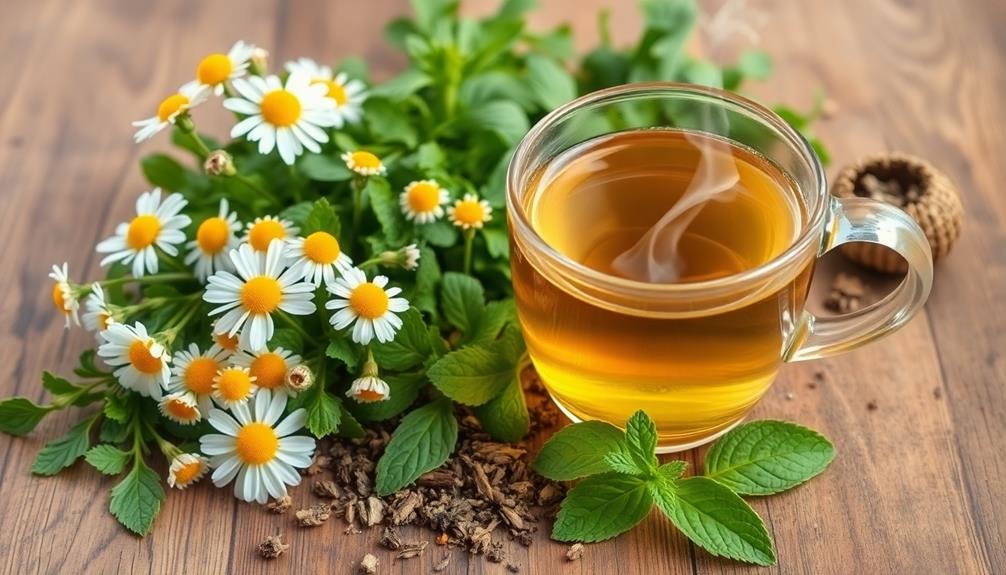
When you're looking for relief from allergy symptoms, certain key ingredients in herbal tea can make a big difference.
Anti-inflammatory herbs, natural antihistamines, and soothing combinations work together to ease your discomfort.
Let's explore these powerful options that can help you breathe easier.
Anti-Inflammatory Herbs
Many allergy sufferers seek relief from their symptoms, and anti-inflammatory herbs can be a powerful ally in this quest. When you experience allergies, inflammation often accompanies your body's response, leading to discomfort. Incorporating anti-inflammatory herbs into your routine can help soothe that irritation.
Turmeric is one of the most renowned anti-inflammatory herbs, thanks to its active compound, curcumin. You can easily add turmeric to your herbal tea for its beneficial properties.
Ginger is another excellent option; it not only combats inflammation but also aids digestion, which can be helpful if allergies upset your stomach.
Chamomile is a gentle yet effective anti-inflammatory herb. It can calm your body and mind, promoting relaxation while reducing inflammation.
Additionally, you might want to take into account nettle leaf. This herb has natural anti-inflammatory properties, making it a great choice for allergy sufferers.
When you blend these herbs into your tea, you create a soothing concoction that addresses inflammation head-on.
Natural Antihistamine Options
For those dealing with allergies, finding natural antihistamine options can make a significant difference in managing symptoms. You'll be pleased to know that several herbs can provide relief without the side effects often associated with conventional medications. Here are some key ingredients to evaluate:
| Herb | Antihistamine Properties | How to Use |
|---|---|---|
| Nettle | Reduces histamine production | Brew as a tea or extract |
| Quercetin | Stabilizes mast cells | Take as a supplement |
| Butterbur | Blocks histamine receptors | Brew in tea or use capsules |
Incorporating these herbs into your daily routine can help ease allergy symptoms. Nettle's anti-inflammatory properties work wonders, while quercetin and butterbur can effectively reduce your body's histamine response. You can brew these herbs into a soothing tea or evaluate supplements if you prefer a more concentrated form. By choosing natural antihistamines, you're not only opting for effective relief but also embracing a holistic approach to managing your allergies. Make these herbs a part of your wellness arsenal, and you might just find the relief you've been searching for.
Soothing Herbal Combinations
Combining herbs can amplify their soothing effects, providing a delicious and effective way to tackle allergy symptoms. Start with chamomile, known for its anti-inflammatory properties. It helps calm your body and may ease nasal irritation.
Pair it with peppermint, which opens up your airways, making it easier to breathe. Its cooling effect also soothes an itchy throat.
Next, consider adding nettle. This herb contains natural antihistamines, helping to reduce the body's allergic response. Blend it with ginger, which can combat inflammation and boost your immune system. Together, they create a powerful mix for relief.
Don't forget about lemon balm. This herb not only enhances flavor but also promotes relaxation and reduces stress, which can be beneficial during allergy season.
Finally, a touch of honey can sweeten your tea while providing additional soothing properties for your throat.
Experiment with these combinations to find what works best for you. Whether you're sipping a warm cup or enjoying it iced, these herbal blends can make a significant difference in how you feel during allergy season.
Enjoy your tea, and breathe easier!
Popular Herbal Blends
Herbal tea enthusiasts often find relief in popular blends specifically designed to combat allergy symptoms. These blends combine various herbs known for their anti-inflammatory and antihistamine properties, creating a soothing drink that you can enjoy throughout allergy season.
One popular blend includes chamomile and peppermint. Chamomile can help reduce swelling in your nasal passages, while peppermint opens up your airways, making it easier for you to breathe.
Another favorite is ginger and turmeric, which are both potent anti-inflammatories that can help alleviate sinus pressure and discomfort.
You might also consider a blend of nettle leaf and rooibos. Nettle acts as a natural antihistamine, and rooibos is rich in antioxidants, providing an extra layer of support for your immune system.
Don't overlook blends that feature licorice root and lemon balm, as these herbs can calm your throat and minimize irritation.
When you choose the right blend, you can enjoy a warm and comforting cup of herbal tea while easing your allergy symptoms effectively. So, explore these popular herbal blends and find the one that works best for you!
DIY Herbal Tea Recipe
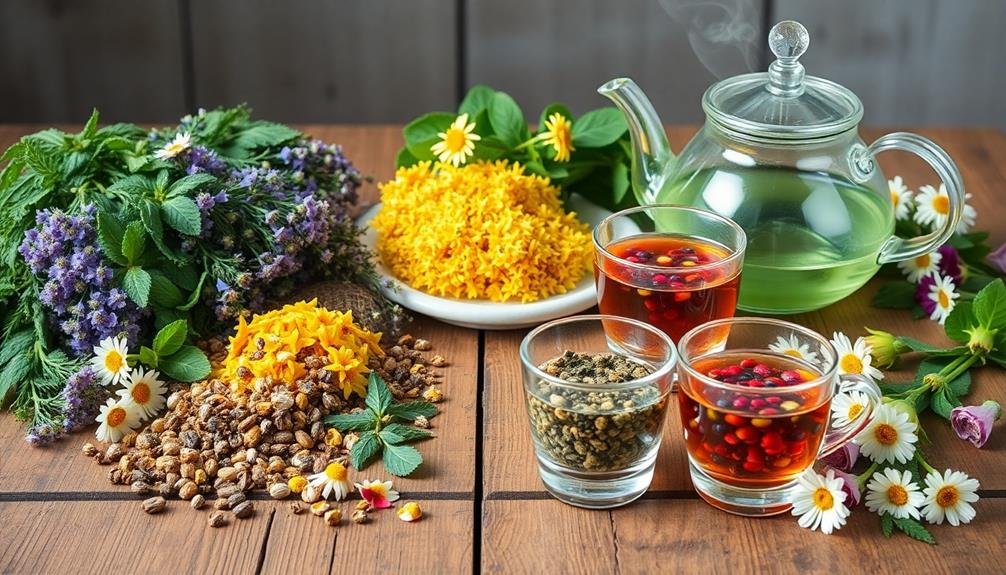
You can easily create your own herbal tea blends at home to combat allergy symptoms. Start by gathering a few key ingredients known for their allergy-fighting properties.
Peppermint is great for opening up nasal passages, while chamomile can help soothe inflammation. You might also consider adding ginger, which has anti-inflammatory effects, or lemon balm for its calming properties.
To make your blend, take one tablespoon of dried peppermint leaves, one tablespoon of dried chamomile flowers, and half a tablespoon of dried ginger. Mix these ingredients in a bowl, and feel free to adjust the quantities based on your taste preferences.
If you want an extra boost, add a few drops of honey for sweetness and additional soothing effects.
Once you've mixed your herbs, store them in an airtight container away from light and moisture. This way, your blend will stay fresh for future use.
When you're ready to brew, simply use one to two teaspoons of your herbal blend per cup of hot water. Steep for about 5 to 10 minutes, and enjoy the benefits of your homemade herbal tea designed to ease your allergy symptoms!
How to Brew Herbal Tea
When it comes to brewing herbal tea, getting the temperature and steeping time right is essential for extracting the maximum flavor and benefits from your ingredients.
Start by boiling fresh, filtered water to a temperature between 200°F and 212°F (93°C to 100°C). If you're using delicate herbs or flowers, aim for a slightly lower temperature of about 190°F (88°C).
Next, measure out your herbal blend. Generally, you'll want to use about 1 to 2 teaspoons of dried herbs per cup of water. If you're using fresh herbs, increase that amount to about 1 tablespoon. Place the herbs in a tea infuser or directly in your teapot.
Once your water reaches the desired temperature, pour it over the herbs, ensuring they're fully submerged. Cover the teapot or cup to keep the heat in, and let it steep.
For most herbal teas, a steeping time of 5 to 10 minutes is ideal, but you can adjust based on your taste preferences. After steeping, remove the herbs, and enjoy your soothing cup of herbal tea, knowing you've maximized its flavor and health benefits.
Tips for Maximum Efficacy
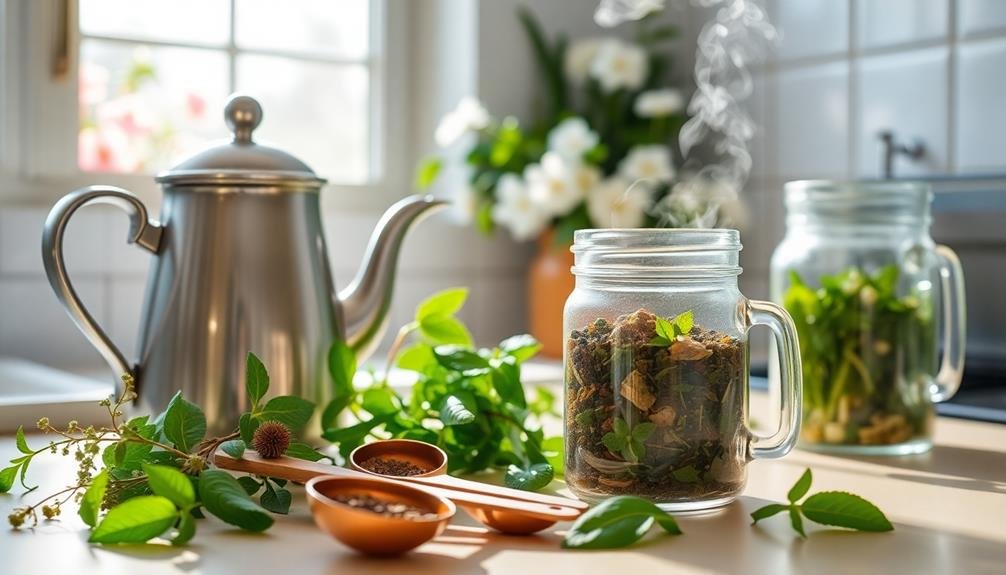
To get the most out of your herbal tea for allergy relief, start by choosing fresh ingredients.
It's also essential to steep your tea at the right temperature to release its full benefits.
Choose Fresh Ingredients
Choosing fresh ingredients is essential for maximizing the efficacy of herbal teas in alleviating allergy symptoms. Fresh herbs and spices not only enhance flavor but also contain higher concentrations of beneficial compounds. When you use dried herbs, they may have lost some potency over time, reducing their effectiveness in combating your allergies.
To guarantee you're getting the best from your herbal tea, source your ingredients from reputable suppliers. Local farmers' markets or specialty herbal shops are often great places to find fresh, high-quality herbs. When possible, opt for organic options to avoid any pesticides that could trigger your allergies.
If you have the space, consider growing your own herbs. Basil, peppermint, and chamomile are easy to cultivate and can be a rewarding addition to your herbal tea preparations. When you harvest your herbs right before use, you'll capture their peak freshness and potency.
Lastly, always check for any signs of spoilage or wilting. Fresh herbs should appear vibrant and fragrant. By focusing on fresh ingredients, you're setting the stage for a more effective herbal tea that helps ease your allergy symptoms.
Steep at Right Temperature
Steeping your herbal tea at the right temperature can make all the difference in releasing its full potential against allergy symptoms. Each type of herb has an ideal steeping temperature that helps extract the beneficial compounds effectively. For most herbal teas, aim for water heated to around 200°F (93°C). This temperature is hot enough to release the active ingredients without scalding the delicate herbs.
If you're using dried herbs, steep them for about 5 to 10 minutes to allow the flavors and benefits to fully infuse. For fresh herbs, you might find that a shorter steeping time of around 3 to 5 minutes works best.
Keep an eye on the color of the tea; it should be vibrant and aromatic, signaling that the herbs are doing their job.
Avoid steeping your tea too long or at too high a temperature, as this can lead to bitter flavors and may even destroy some of the beneficial compounds you're after.
Drink Regularly for Benefits
Regularly drinking herbal tea can greatly enhance its benefits for allergy symptoms. To maximize the effects of your herbal tea, consider these tips:
1. Consistency is Key: Aim to drink herbal tea daily. This helps build up the beneficial compounds in your system, providing continuous relief from allergy symptoms.
2. Choose the Right Blends: Opt for herbal teas known for their allergy-fighting properties. Blends containing ingredients like chamomile, peppermint, or ginger can be particularly effective in managing symptoms.
3. Stay Hydrated: Herbal tea can contribute to your daily fluid intake, which is essential for overall health.
Staying hydrated helps keep your mucous membranes moist, reducing irritation from allergens.
4. Pair with a Healthy Diet: Complement your tea intake with a balanced diet rich in fruits and vegetables. This can enhance your body's natural resilience against allergens.
Storing Your Herbal Blends
Properly storing your herbal blends is essential for maintaining their flavor and potency. To do this effectively, choose an airtight container, like a glass jar or a tin, to keep moisture and air at bay.
Light can degrade the quality of your herbs, so opt for a dark or opaque container whenever possible.
Keep your herbal blends in a cool, dry place, away from direct sunlight and heat sources. A pantry or a dedicated herbal cabinet works well.
Avoid storing them near your stove or in the refrigerator, as fluctuating temperatures can compromise their integrity.
Label your containers with the blend name and the date you made it. This way, you'll know when to use them for maximum effectiveness.
Most blends maintain their best quality for about six months to a year, so try to use them within that timeframe.
Additional Natural Remedies
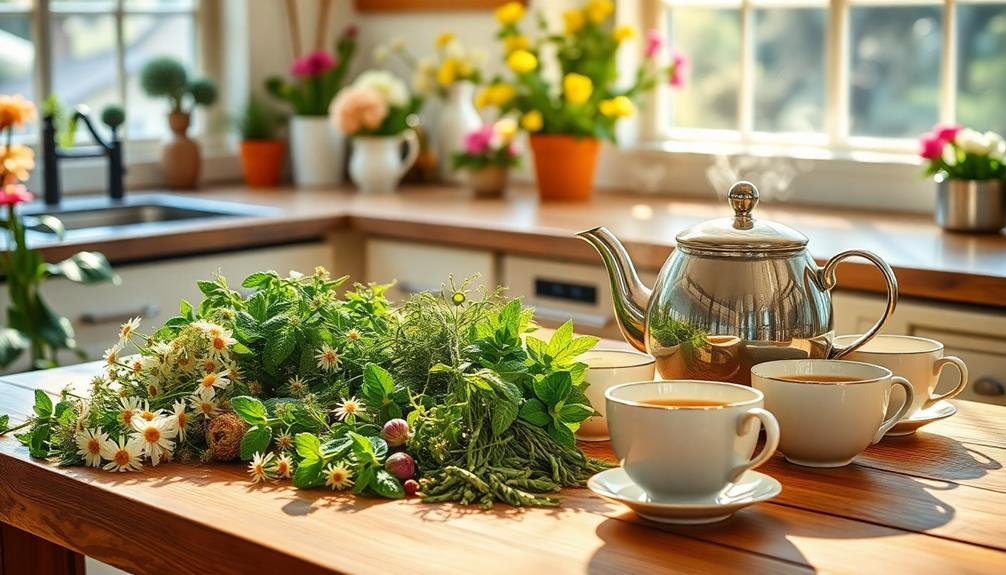
If you're looking for ways to ease allergy symptoms beyond herbal tea, several additional natural remedies can help. Integrating these methods into your routine can provide further relief and support your overall well-being.
- Local Honey: Consuming local honey may help your body build immunity to local pollen. Try a teaspoon daily to see if it works for you.
- Nasal Irrigation: Using a saline solution in a neti pot can clear allergens from your nasal passages. It's a simple way to reduce congestion and discomfort.
- Quercetin: This natural antioxidant, found in foods like onions and apples, can stabilize mast cells and prevent the release of histamines. Consider adding these foods to your diet or taking a supplement.
- Essential Oils: Certain oils, like eucalyptus or peppermint, can open airways and reduce inflammation. You can diffuse them or mix them with a carrier oil for topical application.
Incorporating these remedies alongside your herbal tea can create a thorough approach to managing allergies.
Experiment with these options to find what suits you best and helps alleviate your symptoms.
Frequently Asked Questions
Can Herbal Tea Replace Allergy Medications Entirely?
Herbal tea can complement your allergy medications, but it shouldn't replace them entirely. You should consult your doctor to guarantee you're managing your symptoms effectively and safely while exploring natural remedies like herbal tea.
Are There Any Side Effects From Herbal Teas?
Yes, herbal teas can have side effects. You might experience allergies, stomach upset, or interactions with medications. It's important to consult a healthcare professional before adding new herbal teas to your routine for safety.
How Long Does It Take for Herbal Tea to Relieve Symptoms?
It typically takes about 20 to 30 minutes for herbal tea to start easing symptoms. You'll notice relief as the ingredients work, so sip slowly and enjoy the soothing warmth while you wait.
Can Children Drink Herbal Teas for Allergies?
Yes, children can drink herbal teas for allergies, but you should consult a pediatrician first. Some herbs may not be suitable for younger ages, so always guarantee the blend is safe and appropriate for them.
Should I Consult a Doctor Before Trying Herbal Remedies?
Yes, you should consult a doctor before trying herbal remedies. They can help you understand potential interactions, proper dosages, and any underlying health concerns. It's always wiser to prioritize your health and safety first.
In Summary
Incorporating herbal tea blends into your routine can be a soothing way to ease allergy symptoms. With the right ingredients and brewing techniques, you can create a comforting drink that may provide relief. Remember to experiment with different blends to find what works best for you. By staying consistent and storing your herbs properly, you can enjoy their benefits whenever allergy season hits. Don't forget to explore other natural remedies to complement your herbal tea experience!

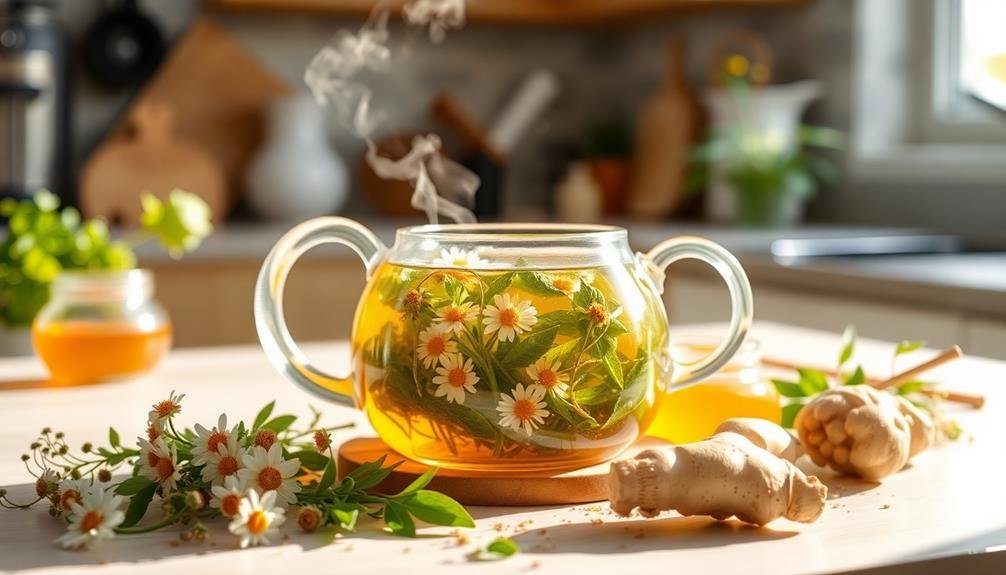
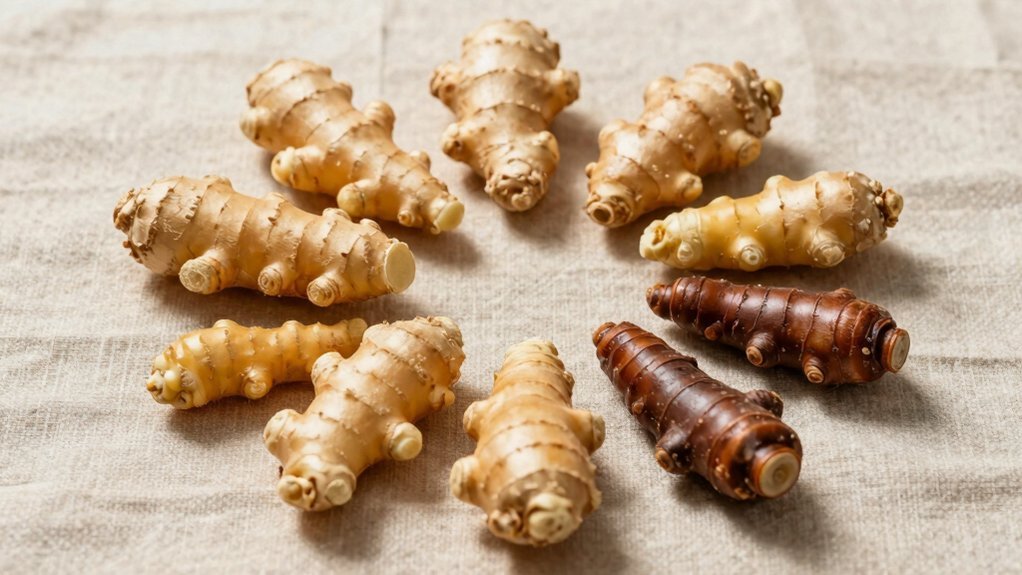
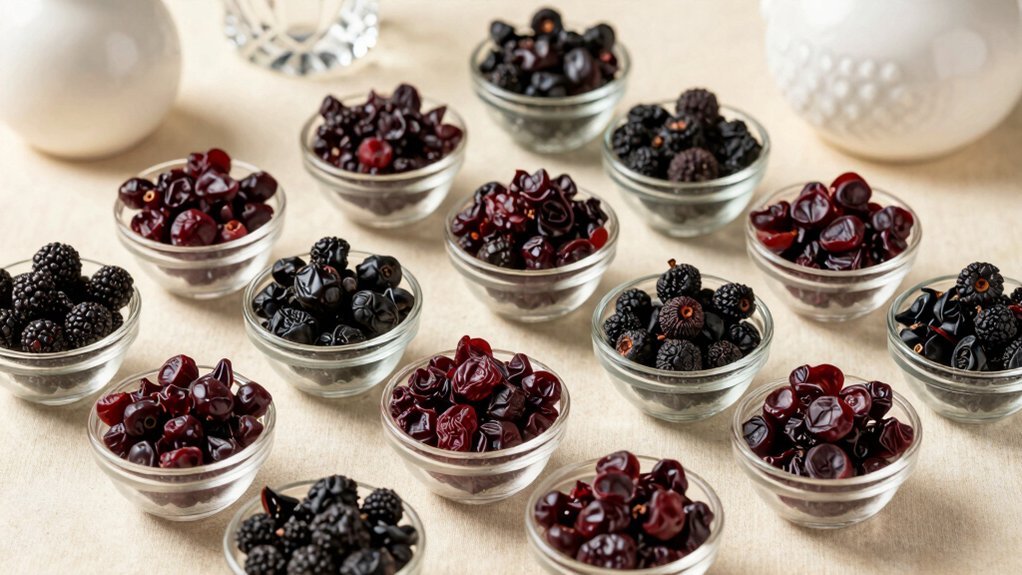
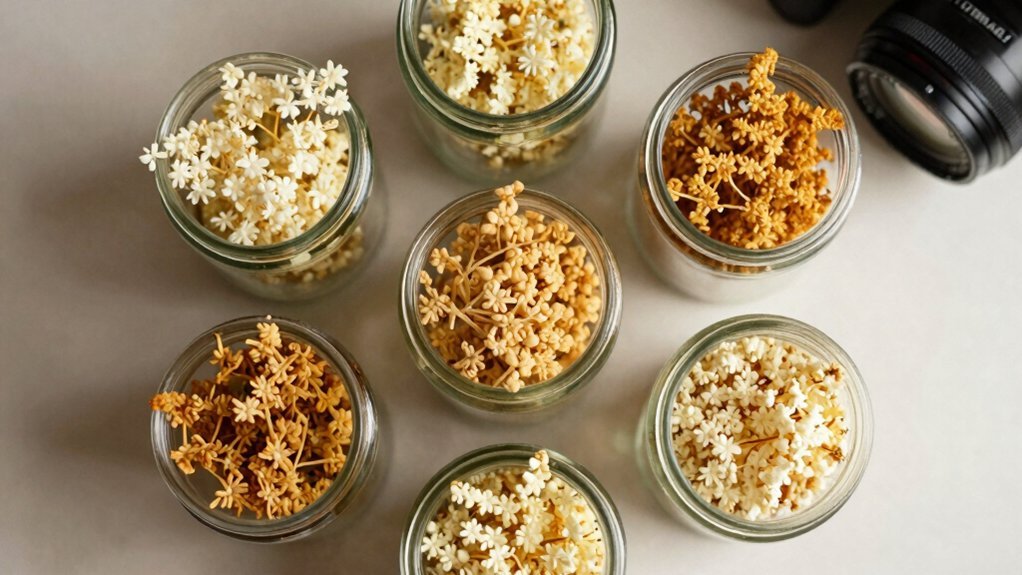
Leave a Reply